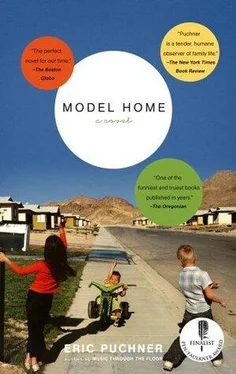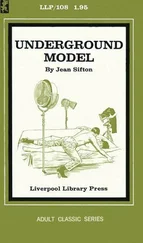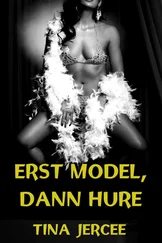Hector walked to the window and parted the blinds with two fingers, watching his mother hang wash on the clothesline. She leaned over the hamper and clutched her lower back, wincing with her eyes closed. The pain in her face fanned Hector’s self-pity. His teeth chattered. He grabbed his jacket from the closet and put it on. He’d find some way to get back at the Zillers; it would come to him spur-of-the-moment, a gift from the gods.
“Where are you going now?” his mother asked in Spanish, catching him as he walked to the pickup. For the first time, the license plate embarrassed him. His mother glanced at the shoe box in his hands before fixing on his rumpled clothes. “When’s the last time you had a shower?”
“Don’t start.”
“You’re dressed like it’s winter.” She stepped closer and he recoiled, clamping the shoe box to his chest. “What is it, mijo ? Did you break up with that girl?”
He laughed. “No. I killed her with Cheerios.”
She stepped back. “Hector, what’s wrong with you? You’re scaring me.”
Hector got in the pickup, driving up Anaheim toward the verdant hill of Palos Verdes rising like a volcano above the smokestacks. He was shivering so much he could barely steer. He hunched over the wheel, trying to decipher the blurry grid of stoplights. Though he’d promised to stop thinking about it, the instant on the beach flashed through his mind again. Hadn’t there been something else, too, before Lyle’s frown? A split-second smile? He’d driven himself crazy with it, trying to remember if she’d really brightened or not, if he’d imagined her face beaming happily when she first caught his eye. Sometimes, clinging to a thread, he imagined that he’d misinterpreted the whole thing. Perhaps she loved him; it was all a mistake; she hadn’t recognized him for real.
No, she’d seen him clearly and hadn’t even managed to lift her hand. Let her call and cry her eyes out — he wouldn’t rise to the bait of making her feel better.
Near the entrance to Herradura Estates, Hector parked out of sight of the gate and crept along the shoulder of the road, clutching the shoe box with two hands. Bud was reading a magazine in the guardhouse. Hector thought about talking his way inside, but he hadn’t been to work in a week and couldn’t bear to show his face. The clock that he and Lyle had broken was still hanging on the wall, stopped at the time of their first fuck. It was like something you’d find in a dream, twinkling with menace. Hector crouched past the guardhouse and hiked along John’s Canyon Road until he reached High Street, turning down the sleepy, tree-lined, untoxic road toward the Zillers’ house. Soapberries popped under his sneakers. There were no cars in the driveway or parked under the carport. Something about the house, the unnatural quiet of it, told him the Zillers weren’t home.
He decided to wait for their return. First, though, he’d take a look inside. He’d see the house once and for all, even if Lyle had never invited him over. The day was clear and beautiful, bees bounced on the rosebushes along the driveway, but he was too feverish to feel the sun’s warmth. Hector rounded the garage until he was facing a window whose blinds were open to the sun. He rested his head against the glass. A bedroom of some kind, probably Lyle’s parents’. A creepy picture of Pac-Man floating in some clouds hung on the wall across from the bed.
Laying the shoe box in a bed of azaleas, Hector picked up one of the decorative rocks at his feet, lifted it to his chest, and then heaved it through the bedroom window, which shattered in a rain of glass. He waited for an alarm to go off. It would almost be a relief. When nothing happened, he retrieved the shoe box and stepped as best he could through the window frame, avoiding the stalactite of glass jutting from the top.
The room was cold as a cavern. Hector could barely think. Still carrying the shoe box, he walked past the bed and down a narrow hall lined with puke-colored artwork and ended up in what looked like the Zillers’ living room. Except for an old patio chair and a TV set, there was no furniture. One of the vinyl straps of the chair was broken, a blob of bird shit meringued to one arm. Hector bent down to pick up a piece of popcorn buried in the rug. A bit of anger unflaked from his heart. He wanted to curl up in the lounge chair and go to sleep but was worried he might not resurrect himself. He looked up at the windows over the TV. The curtains were neatly drawn, letting in a thin cord of sunlight. In the foyer, beside the front door, lay a jumble of old camping gear and what looked like a telescope still packed in its box. For the first time, it occurred to him that the Zillers were out of town.
He walked into the kitchen, where the windows were also curtained. A charred bagel, black as a fossil, peeked out of the toaster. On the counter beside it was a handwritten list titled THINGS TO BRING ON TRIP. Hector’s teeth were still chattering. He wondered if he was dying. Laying the box on the counter, too feverish to think, he walked over to the stove and turned on the burner, trying to warm himself over the flame. It scorched his fingers but did nothing to thaw the coldness in his bones. On the back guard of the stove, lined up in a row, was an array of baffling teas. Lemon Zinger. Evening in Montana. Lotus Flower Dream. He glanced around for a kettle before grabbing a small pot hanging from a rack under the cupboard, filling it to the brim in the sink. Tea might help. Warm his fever. He shivered over to the burner again. By mistake he splashed a bit of the water on the flame, which hissed and sputtered and flowered again under the pot.
It would not boil. Not if he watched it.
Hector grabbed the shoe box and wandered down the hall. He recognized Lyle’s room right away. The wall of paperbacks; the poster of Morrissey in a stupid-looking pompadour; the calaveras taunting him from the windowsill, dressed comically as bride and groom — everything she’d described to him on the phone. Even the smell, a mixture of cigarettes and perfume, was dizzily familiar. Gently, though his hands were shaking, Hector lifted Raoul from his shoe box and laid him on the pillow of Lyle’s bed. He tried to roll his tail back into a spiral, but it was as stiff as a pencil. The chameleon seemed smaller than before, obscene in its stillness. Something about the way it looked — tiny, helpless, eternally dead — made Hector ashamed.
His head throbbed. He hobbled over to Lyle’s desk. Clutching the chair with one hand, he opened the drawer and stared at the mess of tapes and letters and photographs, startled to see a piece of paper with his own handwriting on it. The poem he’d given her. It was crinkled and worn, a tear beginning along one crease. Beneath it was another sheet of paper: a different poem, written in Lyle’s handwriting. It had no title and began in the middle of the page. Hector pulled the poem out, trying to control his shivering enough that he could follow the words.
Mustache
A word made up of two:
Must ache,
A command,
As though I’m supposed to hurt like this
A job I have to finish
Or a formula for missing you
Must + ache =
No bristles kissing me
A lizard on TV
A red pickup that isn’t yours
An inflatable castle
A clock that’s stopped on us
A second name for my heart
Hector’s legs felt weak. A clock that’s stopped on us. He read the poem again, lingering over the last stanza. He remembered the inflatable castle, the kids all screeching with joy as they bounced up and down together, hair flapping like wings. When had he told her about that? Feebly, he folded the poem into a square and stuffed it in his pocket. He could barely stand. He felt suddenly foolish. Misplaced — the way you feel when you wake up somewhere strange, a friend’s couch, and don’t know where you are. His head whistled with pain. If he returned home, if he climbed back into bed where he belonged, his mother would take care of him.
Читать дальше












